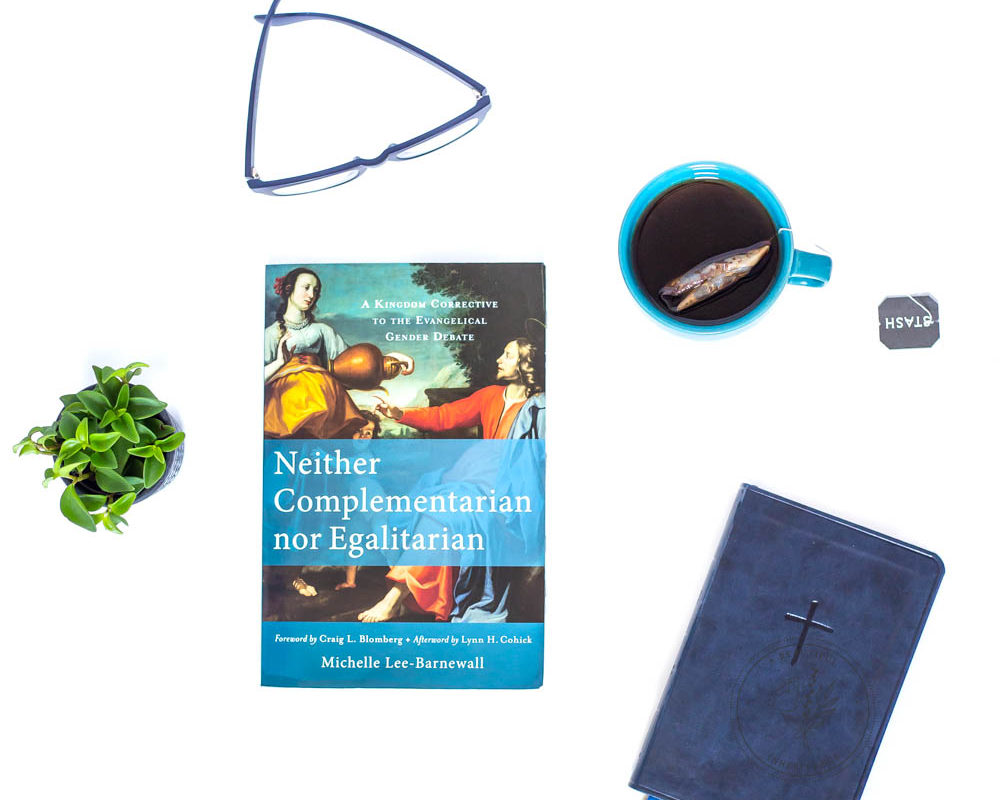This post contains affiliate links
I first came across the title Neither Complementarian Nor Egalitarian by following author and podcaster Phylicia Masonheimer on Instagram and also by listening to her podcast. Dissatisfaction with the idea of having to choose a side in the evangelical gender debate, when neither side fully reflects the scope of God’s plan for men and women as detailed in Scripture, and knowing that the terms complementarian and egalitarian aren’t in Scripture, led to me ordering and reading the book – and I’m SO glad I did.
Neither Complementarian nor Egalitarian is one of the most refreshing resources I’ve come across when it comes to the evangelical gender debate. For those who may be unfamiliar with the two opposing positions, complementarianism generally focuses on the idea that men and women are both created in the image of God with equal value, dignity, and worth yet occupy separate roles in the marriage relationship. Those who hold to this position view the office of elder as one that God has given to qualified men (1 Timothy 2:11-13, 1 Timothy 3:1-7). Egalitarianism focuses primarily on equality for women in both the home and the church and those who hold to this view generally believe that women can hold any church office that a man is permitted to. Generally, the complementarian position consists of legalistic rules unfounded in Scripture, and generally, egalitarianism involves seeking equality and rights – ideas that were unknown in the time and cultures in which the events of Scripture occurred.
It appears that Christianity has adopted some of the ways of the world in that many Christians have been complicit in disunity within the global and local body of Christ by participating in the sin of partiality (James 2:1, James 2:9) toward those within their own spiritual family who hold different convictions than they do on secondary issues. In this day and age, there seems to be an unspoken demand to immediately take a “side” on every minor issue in order to truly be a Christan, and trying to navigate which side actually fits within the scope of Scripture is exhausting and leaves much to be desired. Since Jesus Himself prayed for His people to be united (John 17:20-23), I suspect that condescending attitudes toward those who hold different positions on secondary issues or pridefully attempting to bind consciences as if one’s convictions are the only convictions acceptable does more harm to the gospel message and the Christian witness than good. In this regard, Neither Complementarian nor Egalitarian was especially encouraging.
Author Michelle Lee-Barnewall, who boasts an extremely impressive curriculum vitae, spends a good portion of the book focusing on the concept of unity. At the beginning of her book, she encourages readers that rather than looking at verses individually it makes the most sense to understand verses within the context of the whole Bible. She also urges readers to approach Scripture first from a literary standpoint. On page 126, she helpfully explained, “The desire to answer pressing contemporary questions such as ‘Does the husband have authority over the wife?’ and ‘Who makes the final decision in a marriage?’ means that interpreters often come to the text with preset questions that require specific types of answers and thus leave little room for an alternative. A literary approach can help overcome this tendency to ask and answer predefined questions. It begins not by asking ‘Does God give Adam a special authority? or ‘Are Adam and Eve equals?’ but rather by asking questions such as ‘What does the author intend to convey about Adam and Eve?’ and ‘What does the passage tell us about God and his relationship with and purposes for Adam and Eve?’ Although the latter questions may lead to an answer that addresses authority and/or equality, they are not limited to or automatically centered on these concerns.”
Perhaps my favorite aspect of the book is its emphasis on exploring the broader themes of Scripture including unity and holiness. I am deeply grateful to Lee-Barnewall for pointing readers to these important themes which are at the heart of the gospel and what Christian marriages are made to mirror (Ephesians 5:25-32). I really appreciate that Lee-Barnewall draws the attention of her readers to the beauty of the gospel by emphasizing unity and love. Rather than answering specific questions, she gives us a framework for asking better ones. This is a helpful approach in that it compels readers to invest their own time reading and studying the Bible and gives them the freedom to come to their own convictions on a nonessential issue.
Regarding how the issue of gender is generally approached, Lee-Barnewall wrote, “The current situation often highlights practical concerns regarding what women can or cannot do or who makes decisions. Such questions ultimately need to be answered. However, the wisest course may not be to use them as a starting point. When they do form our starting point, the answers predictably revolve around the construction or absence of rules. While our practical questions are also based on deeper, underlying concerns such as ‘Who has authority?’ or ‘Are men and women equal?’ the point is not simply whether men have a special leadership role or what rights women have. Instead, gender in the Bible may relate more fundamentally to the holiness of God, so that the focus is on orientation as the church and Christian marriage demonstrate the superiority of the way of the cross. Keeping larger purposes such as these in mind may then provide a better context in which to answer the practical questions and other concerns,” (pg. 169).
The book concludes with the acknowledgment that, “The goal for both sides can be to make the more fundamental consideration not personal benefit or position but the imitation of Christ in the willingness to suffer loss for the benefit of others. This speaks to the larger goal of love and unity in the corporate body, as the church models the example of Christ for a watching world,” (pg. 176).
Neither Complementarian nor Egalitarian really encouraged my heart as it presented a view of marriage and the gospel that is beautiful and makes much of Jesus. It offers a much needed hopeful and biblical perspective about the evangelical gender debate and I’m pleased to give it my highest recommendation.







